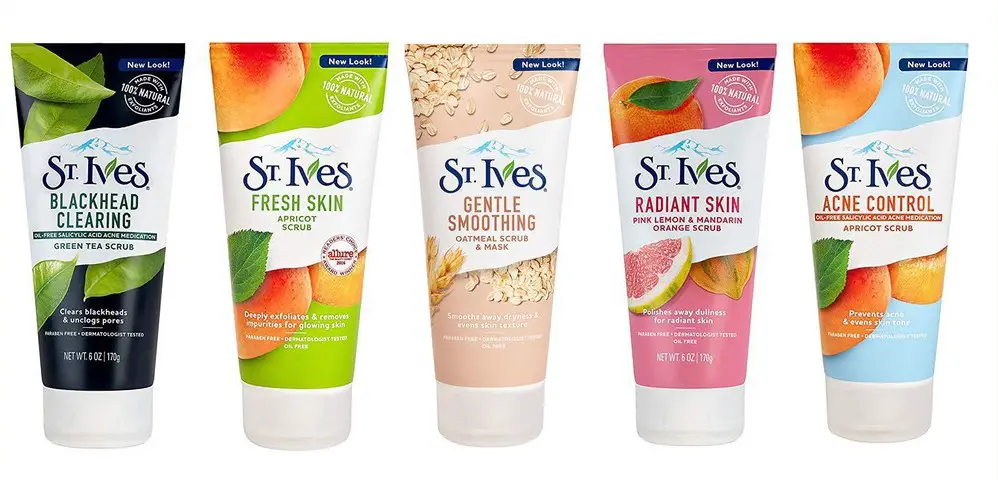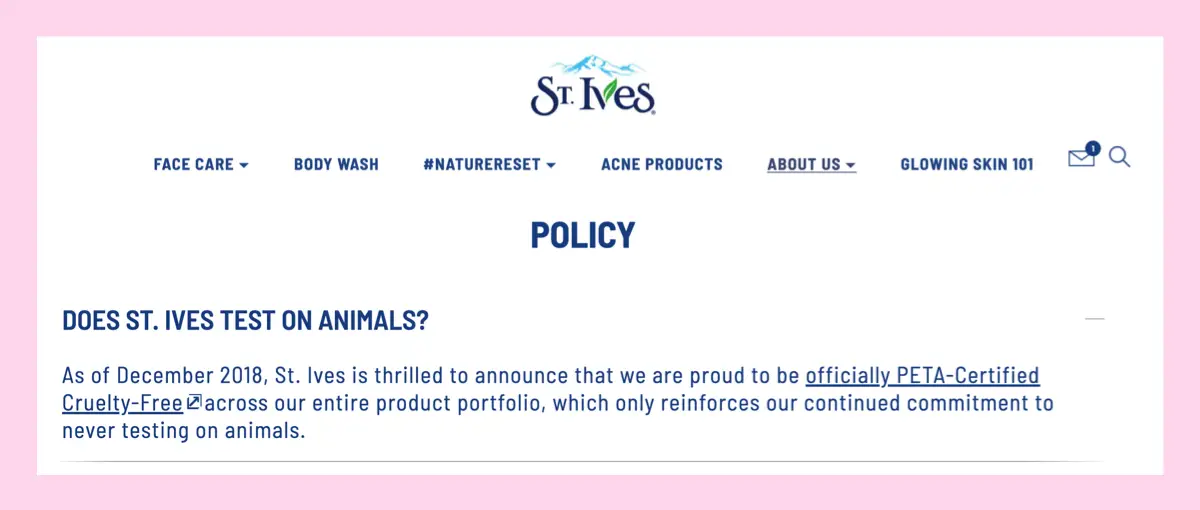St. Ives is a decades-old personal care brand that’s famous for making affordable and accessible cosmetics – most notably their Apricot Scrub. But have they kept up with the times? Here’s what we know about their current cruelty-free and vegan policies.
St. Ives is cruelty-free. It doesn't conduct animal testing on its products, nor does it distribute its cosmetics where animal testing is required by law. While St. Ives does offer a range of vegan cosmetics, it is not considered a vegan brand.
St. Ives is a Californian-based brand that was founded in 1955 by Robert van Dine and Gary H. Worth. Although the brand is completely American, the pair were inspired by Swiss cosmetics.
Together they chose to harness the Swiss tradition of combining herbal extracts and modern science in their formulas.
By the 1980s, St. Ives finally became recognized for their super affordable and effective Apricot Scrub, which was (and still is) one of the most popular scrubs on the market. Even celebs like Gigi Hadid endorse it!
Even if this scrub is scrutinized by dermatologists for being too abrasive – people are still obsessed, and the brand is immensely popular 67+ years on!
In fact, in 2010, Unilever bought St. Ives's parent company, Alberto Culver, for $3.6 billion.
So what does this tell us about the brand’s ethics?
Before deciding on what to buy, here's what you need to know about St. Ives's current animal testing policies, vegan ranges, formulation, and sustainability.
Is St. Ives Cruelty-Free and Vegan?
St. Ives is 100% Cruelty-Free
It does not:
After decades on the market, St. Ives finally became PETA certified in 2018. The brand maintained that it was cruelty-free before then, but there wasn’t any accreditation to back up its claims.
Since St. Ives was bought over by Unilever in 2010. Some animal activists may feel like the brand isn’t 100% cruelty-free anymore since Unilever still does allow for animal testing when required by law – but St. Ives is not involved in these processes at all.
This brings us to our next point:
St. Ives is Not Vegan
Although the brand is not entirely vegan – it’s pretty close.
St. Ives only has two products that use animal-derived ingredients – the rest are completely vegan. These include the Collagen & Elastin Moisturizer and Collagen & Elastin Body Lotion.
The only two animal-derived ingredients that St. Ives uses are:
If you're interested in which products are vegan or finding vegan brand alternatives – keep reading or click on this link: St. Ives vegan products.
Animal Testing Policy and History
St. Ives has been around for decades, so it’s difficult to know what the brand's animal testing policy was in the 50s.
Although they do claim to be cruelty-free from inception, St. Ives only became officially PETA accredited in 2018.Cruelty-Free Status in 2022
Here is a screenshot of St. Ives's official statement regarding its cruelty-free policies and vegan products, taken from their website:
Certification
Currently, St. Ives is PETA-approved which is not a bad start. But we would love to see more certification from them since it’s a proudly cruelty-free brand.
While you might know PETA very well – it surprisingly doesn't hold the strictest cruelty-free regulations. It seems only to require a brand's written consent that abides by the PETA code of conduct.
Certification from Leaping Bunny is ideal because it holds rigorous standards and does regular audits to ensure they are upheld.
The Leaping Bunny association’s strict and reliable regulations stipulate that:
But some certification is better than nothing at all.
If you see a bunny stamp on the back of your product bottle – that's an excellent sign. But don't let the image itself fool you. A lot of brands are using fake logos to deceive consumers.
Do your homework and see which products are genuinely cruelty-free first. This article will help you: Which Cruelty-Free Logos Can You Trust?
Is St. Ives Sold Where Animal Testing is Required By Law?
St. Ives does not distribute any of its products to China or any country that requires animal testing on any cosmetics by law.
China has a shocking track record. It is the country with the most animal testing globally, with over 20 million animals used per year.
However, if you live in China or are concerned about its cruel beauty policies, there are a couple of loopholes. Here's how to find cruelty-free cosmetics in China: Are Cosmetics Made in China Cruelty-Free?
What St. Ives Products Are Vegan?
All St. Ives products are vegan, with the exception of their Collagen and Elastin moisturizer and Body Lotion. This means you have an immense selection to choose from if you follow a vegan lifestyle.
But if you want to buy the Apricot Scrub (again) – hold on a second. While it is one of the most popular products – it’s actually not one of our favorites.
To save you some time, here are some of St. Ives most popular and award-winning products to choose from:
For a full list of St. Ives vegan products, you can visit their website.
Vegan Alternatives to St. Ives
St. Ives offers products that other brands cannot match price-wise. However, there are a few concerns that will raise a few eyebrows.
If you're looking for 100% vegan face care products that are in a similar price range (or a bit more expensive), here are some similar alternatives:
Is St. Ives Natural and Organic?
While St. Ives does use some natural ingredients, they are not a holistic natural or organic brand.
While they may claim to be quite natural, most of their ingredients are clean synthetics.
Since its inception, they have combined both natural and manmade ingredients to develop its reliable formulas.Clean vs. Natural Ingredients
The term "natural" is not regulated for cosmetics and skincare. In other words, it doesn't hold one specific meaning.
Usually, it means a product is free of certain more toxic synthetic ingredients, including parabens, phthalates, sulfates, and more. But people also interpret "natural" to mean ingredients of immediate plant origin.
Here's the thing: "natural" is not necessarily good. Just because an ingredient is natural doesn't mean you should rub it on your skin. Poison ivy is natural – but we wouldn't recommend rolling in a field of that stuff!
All products use a certain amount of synthetic ingredients in their formulas, and St. Ives is no exception – but it can choose to use better or clean synthetics.
If a synthetic ingredient is "clean," it is safe and non-toxic for us. Its purpose is to preserve the stability of a beauty formulation.
A few naturally-derived ingredients St. Ives uses to enhance its cosmetics include:
Does St. Ives Use Safe Ingredients?
According to Skin Safe, St. Ives has an 82- 91% allergen-free ranking for each product.
All St. Ives products are paraben-free, and many are also free of allergens such as MCI/MI, nickel, gluten, soy, propylene glycol, oil, and irritants.
Reading the ingredient list is crucial because St. Ives is not 100% hypoallergenic or non-comedogenic, and they do not claim to be.
However, many products are specifically for these concerns, so make sure you buy what your skin needs.
The EU/UK Have Stricter Ingredient Regulations
As a conscientious shopper, you must read up on any brand's ingredient list before you make a purchase – especially if you live within the United States.
This is because the FDA has only banned or restricted 11 harmful chemicals from cosmetics within the country. Europe and the UK, on the other hand, have banned 1,328!
For good measure, here are some of the ingredients you really want to avoid with skincare:
St. Ives Apricot Scrub Controversy
In 2016 two people filed a lawsuit against Unilever stating that St. Ives Apricot Scrub packaging misrepresents the product by stating “dermatologist tested” without acknowledging if dermatologists would recommend the product.
They also claimed that the non-comedogenic claim was false and that the walnut powder in the formula caused tiny microtears in the skin, which could lead to irritation, inflammation, and infection.
As early as 2001, internet forums had reviews calling out the St Ives Apricot Scrub for being damaging.
Industry professionals were speaking out against how abrasive the walnut shells are and that they do cause micro-cuts in the skin.
Online beauty forums were filled with professional aestheticians warning therapists-in-training from using the product or any dupes.
The situation got even more complicated in the mid-2000s after the ban on plastic microbeads in cosmetics, and some dermatologists recommended walnut and apricot scrubs as a plastic-free alternative.
Regardless of all this controversy, countless reviews hold the product in a positive light.
Eventually, this lawsuit was thrown out in 2017, but the backlash against walnut and apricot scrubs has lived on even as other brands launch their own versions… Yes, we’re looking at you, Kylie Jenner.
Are Cruelty-Free Ingredients Safe?
If you're worried about how safe it is to use cosmetics that are not tested on animals – please relax and take a sigh of relief.
There is no reason why cruelty-free products shouldn't be just as safe, if not safer, than anything tested on an animal.
Not only is it easy to test ingredients without using animals altogether, but there are so many pre-approved ingredients you can use to make cosmetics that there really is no need.
If you're interested, here's more on the subject: Are Cruelty-Free Cosmetics Safe?
Is St. Ives Sustainable and Ethical?
St. Ives talks about sustainability and ethical initiatives. They claim it ties in with the company’s ethos of preserving natural resources; however, they don’t dive into what this means for them.
They simply state that they tackle a number of environmental issues, like biodegradability and recycling, through programs.
What programs? We’re not sure.
They also mention they’re part of industry-wide coalitions and trade associations.
Which ones? We also cannot tell you.
It's no secret that the world has a huge waste problem, and cosmetic brands are only making it worse by using unsustainable packaging and harmful ingredients.
As it stands, the brand claims to:It’s a bit unfortunate that there’s so much talk about their sustainability efforts (mainly established by Unilever) but not much evidence about what that actually means for them as a brand.
Most companies tell us the progress they’ve made due to their efforts, and we can’t see much of this from St. Ives.
However, here’s some stuff we can tell you.
Some of the ways St. Ives is taking environmental accountability is by:
Final Thoughts
St. Ives has a long history of good reviews. They do try to use natural ingredients where possible and have some concern for the environment.
There are a few ethical factors taken into consideration through donations and charitable sponsorship. And the fact that they are cruelty-free is a step toward a more sustainable future in skincare.
The concerns around their Apricot Scrub are worth taking into account.
If you have sensitive skin – it’s probably not the right product for you. We would recommend staying clear of all mechanical exfoliators and using a chemical containing fruit acids like Alpha Hydroxy Acid (AHA) instead.
Of course, since St. Ives is not 100% vegan – it might not be the best choice for activists who go the extra mile. Especially since it’s owned by the conglomerate Unilever.
Luckily, there are many other affordable options to consider in its place.
We think St. Ives could do more as a brand. So if you feel the same way, we encourage you to speak to the brand. The more people speak up, the more likely it is that they will listen to their consumers' shared needs.


